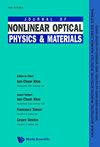钨或钴掺入钽阻挡层控制了沉积铜的形态
IF 2.3
4区 物理与天体物理
Q2 OPTICS
引用次数: 0
摘要
半导体器件的进步推动了21世纪信息和通信技术的爆炸式发展,这一进步是由摩尔定律和随之而来的晶体管的大幅缩小所推动的。然而,目前公认的是,目前使用的铜互连正在成为亚纳米尺度的瓶颈。半导体器件在互连金属可用的体积内需要扩散屏障和种子层。这就限制了互连的最小尺寸,铜更倾向于形成不导电的3D岛,而不是导电薄膜。因此,迫切需要替代铜,这有其自身的困难,或者减少扩散屏障和衬里所占的体积;理想情况下,需要找到一种同时显示这两种属性的材料。我们之前已经表明,将Ru掺入TaN的表层是通常的TaN/Ta或TaN/Ru堆栈的强大替代方案。在这项工作中,我们研究了可以加入TaN的其他可能的金属,即Co和W,它们比Ru更便宜和关键,并且有可能超越它。我们从静态弛豫和从头算分子动力学得到的第一性原理密度泛函理论结果表明,有几种Co和w掺杂的TaN成分可以促进二维铜互连的生长,而不会影响TaN的势垒特性。有了这种材料的选择,应该可以设计新的实验工艺,促进下一代电子设备的缩小铜互连。此外,我们的工作提出了一种改进的方法来预测给定衬底上的薄膜形态,这可以用于各种材料科学应用。本文章由计算机程序翻译,如有差异,请以英文原文为准。
Incorporation of tungsten or cobalt into TaN barrier layers controls morphology of deposited copper
Progress in semiconductor devices, which has enabled the information and communications technology explosion of the 21st century, has been driven by Moore’s Law and the accompanying aggressive scaling of transistors. However, it is now acknowledged that the currently used copper interconnects are becoming a bottleneck in sub-nm scaling. Semiconductor devices require a diffusion barrier and a seed layer in the volume available to the interconnect metal. This then limits the minimum size of the interconnect and copper suffers from a preference to form 3D islands which are non-conducting rather than conducting films. Therefore there is a pressing need to either replace copper, which has its own difficulties, or to reduce the volume taken up by the diffusion barrier and liner; ideally finding a single material displaying both properties is needed. We have previously shown that incorporation of Ru into the surface layer of TaN is a strong alternative to the usual TaN/Ta or TaN/Ru stacks. In this work we study other possible metals that can be incorporated into TaN, namely Co and W, which are less expensive and critical than Ru and can potentially outperform it. Our first principles density functional theory results from static relaxations and ab initio molecular dynamics show that there are several compositions of both Co- and W-doped TaN which should promote growth of 2D copper interconnects without compromising the barrier properties of TaN. With this selection of materials it should be possible to design new experimental processes that promote downscaled copper interconnects for the next generation of electronic devices. Additionally, our work presents an improved method towards prediction of thin film morphology on a given substrate, which can be of use for a variety of materials science applications.
求助全文
通过发布文献求助,成功后即可免费获取论文全文。
去求助
来源期刊
CiteScore
3.00
自引率
48.10%
发文量
53
审稿时长
3 months
期刊介绍:
This journal is devoted to the rapidly advancing research and development in the field of nonlinear interactions of light with matter. Topics of interest include, but are not limited to, nonlinear optical materials, metamaterials and plasmonics, nano-photonic structures, stimulated scatterings, harmonic generations, wave mixing, real time holography, guided waves and solitons, bistabilities, instabilities and nonlinear dynamics, and their applications in laser and coherent lightwave amplification, guiding, switching, modulation, communication and information processing. Original papers, comprehensive reviews and rapid communications reporting original theories and observations are sought for in these and related areas. This journal will also publish proceedings of important international meetings and workshops. It is intended for graduate students, scientists and researchers in academic, industrial and government research institutions.

 求助内容:
求助内容: 应助结果提醒方式:
应助结果提醒方式:


